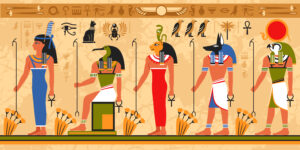“Jesus Himself was in the stern, asleep on the cushion; and they woke Him and said to Him, ‘Teacher, do You not care that we are perishing?’ … They became very much afraid and said to one another, ‘Who then is this, that even the wind and the sea obey Him?'” (Mark 4:38, 41).
The disciples’ theological response to the physical dangers of the storm are directly related to their failure to recognize the true identity of the one sleeping peacefully with them in the boat. Based on very unique shared vocabulary and sequences of events to the story of Jonah 1, we are right to assume the frightened disciples woke Yeshua from his slumber so that he would call on his God (Jon 1:6). By calming the storm, however, Yeshua demonstrated through his actions that he himself is God (see Jon 1:15-16; Ps 106:9). And for readers who have been paying close attention to Mark’s presentation of the divine identity of Yeshua this should come as no surprise. For even in the very first verses of the Gospel, Mark introduces Yeshua as Y-H-W-H who as come to save his people (see Mark 1:1-4).
“Don’t you care we are perishing?”
And herein lies the root cause of the disciples’ doubts about Yeshua’s care for them. By asking, “Don’t you care we are perishing?”, the disciples prove they simply do not know the true identity of the one who was with them in the boat. For what else other than supernatural love would have made the Maker of heaven and earth (see Jon 1:9) set aside his visible glory to sit with stinky, frightened, confused fishermen in a storm-tossed boat?
No matter how fierce the storms of life, and despite the pain we suffer from tragic losses, the historical reality of the incarnation is the one absolute and irrefutable proof that Yeshua really and truly loves us.
“He caused the storm to be still, so that the waves of the sea were hushed. Then they were glad because they were quiet, so He guided them to their desired haven. Let them give thanks to the LORD for His lovingkindness, and for His wonders to the sons of men!” (Psa 107:29-31).










